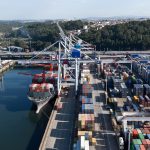Home security as a factor for cohesion and development
Geopolitcal risks and strategies
Europe is going through one of its most uncertain and difficult periods, facing a sea change in the kind of threats from without according to Portugal Home Affairs Minister, José Luís Carneiro (Ministro da Administração Interna de Portugal – MAI).
According to a number of studies and reports recently published – of which entrepreneurs and business leaders are well aware – without the effective guarantee of security, to communities, people and their patrimony, and without these expectations of security, and a stable model of life and society it is not possible to build a balanced and cohesive society, which is a fundamental condition for an integrated development of any country and region. and the acheivement of freedoms of the rights and guarantees of their citizens.
Which is why the preservation of the reputation of a peaceful and secure country like Portugal is an important factor for the development of any country, particularly in sectors such as tourism and overseas investment attraction and talent, and the mobilisation of society as a whole, and local communities for socio-economic progress.
Security is therefore a strategic asset for democratic states, a structural factor for cohesion and national security. “We have to be aware of the possible scenarios for threats and risks which generate structural consequences and vulnerabilities for the societies that make up the state” said José Luís Carneiro, as stipulated in the Portuguese Internal Security Law of 2008.
Addressing a group of business leaders at a lunch organised by the International Club of Portugal on Wednesday at the Lisboa Sheraton Hotel & Spa in Lisbon, the minster highlighted that Portugal and Europe was facing levels of security threats not seen in several decades. “Without being pessimistic, but rather a well-informed optimist, it is our interpretation that we are at a juncture which apart from being marked by a turbulence (economic and energy) that is well known, one of uncertainty and transition, shows signs in the sense of a non-linear logic in the types of threats.
“Europe today faces a panorama which is fluid on security, affected by threats which are constantly changing”, he said.
“Trans-national terrorism, organised crime, smuggling of drugs and people, nationalist extremism are direct threats to citizens, and to our European lifestyle. Cyberattacks and cybercrime continue to grow exponentially”, he added.
This diagnostic from José Luís Carneiro has as its backdrop a combination of the Covid-19 pandemic, whose real effects on society and democratic societal models are now becoming visible. The emergence of the War in Ukraine and its systemic effects, the increase in ideological extremism, and in particular the rise in the radical extreme right and left, are all considered by the European Union as the principle threats to democratic states.
Now, more than ever, it is important for preserving democratic institutions, the vales and principles that underpin the construction of the European Union – freedom, security, and justice.
These could only be assured through a common European security policy, whose conceptual pillars are defined by this strategy.
This included advances and improvements to immigration and asylum policy, in Portugal’s case involving the restructuring of the immigration and borders agency – SEF (which will be dissolved and reformulated into a new organisation with the separation of competencies currently covered by SEF and divided by 5 different agencies – see article: https://www.essential-business.pt/2023/04/07/government-dissolves-borders-and-immigration-agency-sef-and-creates-new-organisation/ ).
The European Union, with its common and integrated internal security framework, made it unique as a political and commercial block in the international system. The only institution and project that is based on normative, regulated power, and which sets it apart in the (other) international powers system.
But he warned that a positive cohesion was always at risk of being replaced by a negative cohesion, based on fear and the erection of barriers to tolerance (Editor’s note: a good example being the autocratic regime in the Russian Federation).
“We should not confuse democratic authority with authoritarianism, this weakens a pluralist democracy, weakens the social state, freedoms, rights, and guarantees of citizens”.
But despite Portugal being the target of several threats, like the EU as a whole, “Our country has displayed good indices for security, as seen in international reports. Comparing numbers from 2013 with those of 2022, we have 20,000 fewer incidents of crimes”, he said.
The minister, who has served in the Government as the Secretary of State for the Portuguese Overseas Communities, defined three areas of action organised under the umbrella term SIM (Systemic, Integrated and Multilayered).
“We have to adopt mechanisms that foster an interdependence and cooperation between various security models. When referring to cooperation, I mean a close cooperation between Portugal’s Central Administration and Regional, District and Local Administrations”, said José Luís Carneiro.
He also stressed the need to maintain and strengthen European security and freedom of movement within EU borders – the Schengen Space – to cope with Europe’s demographic challenges.
Restructuring SEF
Portugal’s Home Office minister stressed at the ICPT luncheon that Portugal is a welcoming country with well-regulated and secure borders
The minister explained how Portugal’s current borders force and immigration agency SEF is to be dissolved in favour of setting up a new agency called the Portuguese Agency for Migration and Asylum (Agência Portuguesa para as Migrações e Asilo) (APMMA) which will be more focused on immigration and less focused on policing borders – a matter which will now left almost exclusively to Portugal’s combined police and security forces.
Regulated and secure
On the subject of police, José Luís Carneiro went on to pay tribute to the work of Portugal’s Civil Protection organisations, at national, regional, district and parish levels, and highlighted the important work undertaken by Portugal’s police forces which comprise the Public Security Police (Polícia de Segurança Pública) (PSP), and National Republican Guard (Traffic and Rural Police) – (Guarda Nacional Repúblicana) (GNR).
Migration and Crime
The Portuguese Minister for Home Affairs emphasised a misconception often touted among the general public that there is a direct relationship between crime and immigration which he roundly refuted.
“It is very important that we should never establish a correlation between the two for various reasons, because it is simply not true. There is no relation between migrants and crime. If that were the case then we would have a much higher crime rate. Unfortunately, the vast majority of crimes are committed by local Portuguese nationals”, he stressed.
The minister made a point of referring to comments made by a Portuguese MP from the far right wing populist party Chega who criticised the Portuguese Home Office for its “almost total lack of effective borders control regarding immigrants; an assertion which was rebuffed by José Luís Carneiro who said that Portugal’s borders were “regulated (policed) and secure”.
In a parliamentary debate (‘Debate on Immigration and Security) on the perceived problem which had been called for by Chega MP Rui Paulo Sousa, the MP had stated: “At the moment thousands of immigrants are flooding into (Portugal) attracted by false promises of work and good living conditions, without any type of effective control”, with many of them coming from conflict areas where they could be either aggressors or victims”.
The Chega MP also criticised the Government’s decision to abolish SEF (Serviço de Estrangeiros e Fronteiras) accusing it of dissolving the “only security service whose principal mission was to control (the movement of) persons across the borders”.
Rui Paulo Sousa slammed “this policy of harbouring immigrants and refugees which makes no sense and urgently needs to be altered”, adding that the Government’s immigration policy had “completely failed”.
The MP accused the Government of “closing its eyes” and “sweeping the whole issue under the carpet”, at the cost of those who accommodate the immigrants and the immigrants themselves”.
And continued by saying the Government’s open doors policy, which allowed immigrants to come into Portugal any which way, without any criteria and control”, had resulted in the kind of “sorry affair” seen in Lisbon ’s Mouraria neighbourhood when a tenement house packed with immigrants from Asia caught fire, resulting in the deaths of two of them.
Rui Paulo Sousa also pointed to the manner in which the immigrant population in Odemira was living “without the basic conditions of safety and hygiene” as well as the “act of pure terror” perpetrated last week when a refugee caused the death of two women at Lisbon’s Ismaeli Centre, an attack which the minister called an “isolated act”.
But in terms of crime, imported from overseas or homegrown, Home Affairs Minister, José Luís Carneiro said that crime cases in Portugal according to statistics had gone down by 7.8% for serious crimes committed, and had only risen by 2.4% in terms of general/petty crimes, since 2019, remarkable given the social and economic uncertainties caused by the Covid-19 pandemic and the current cost of living crisis.
Of these, robberies and theft were responsible for the lion’s share, meaning that crime and fallen in these two areas by 12% since 2019. As for policing initiatives and vigilance such as patrols, these indices had gone up by 30% for the same period.
And Home Affairs Minister, José Luís Carneiro pointed out the number of overseas relocaters attracted to Portugal with the low crime rate and high security being cited as one of the main reasons Brazilians, United States, British and European citizens have been moving to Portugal.
“Portugal is among the most peaceful countries in the world and said that the Portuguese police services made a “decisive contribution” to this result and had contributed to the “prestige of the State”.
The minister then went on the structural reorganisation of SEF, aimed at improving operational shortcomings, taking into account operational gains in efficiency, and also taking into account a new and necessary approach to migratory phenomena.
“Today there are essential political imperatives in the European project – maintaining and reinforcing the Schengen space as a space of security, sovereignty and justice as one of these imperatives, and meeting European demographic challenges providing an effective response to all those who seek a European Union as a life project”.
He said that the new borders entity arrangements would “assure safer borders” and ensure a more effective response to “combatting illegal immigration and trafficking of people”.
Measures also include the creation of a Borders Coordination Unit to improve levels of security at borders and will have representatives from the ministries of Internal Administration, Defence, and Justice who would cooperate and share information and analyse the risks and threats within the space of Portugal’s borders.










